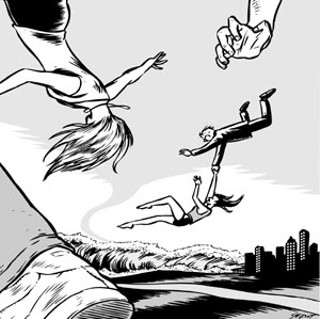Letters at 3AM
Don't read this on a bad day
By Michael Ventura, Fri., July 23, 2004

Last October, while watching the World Series, a commercial break came on for the 11 o'clock news, and for a brief moment I saw something ... I don't have the words ... something colossal, monstrous, magnificent: the sun, with great flares flashing from it ... then a huge space opened in the middle of the sun, like a mouth opening, and an enormous fireball the size of many planets shot out of the sun ... and they were calling that a "flare"!
I've read astronomy, but my brother Vinnie has read lots more, spiced with astrophysics. I knew that 2,000 miles away he was watching the World Series too, so I got on the phone and asked if his TV station had broadcast anything about the sun. No. I described to him what I saw. "In my reading, Vinnie, that's not supposed to happen." "Mike," he said, "that's really not supposed to happen. And every scientist who saw what you saw, they ain't watching the World Series anymore. They're on the phone and on the computer and they're shitting their pants."
Suspiciously, as far as I was concerned, the 11 o'clock news didn't repeat that shot. No coverage I saw ever repeated it. The sun footage of the next days and weeks was incredible, but not colossal, monstrous, magnificent, terrifying. (The still photos in the magazines just didn't capture the power of it.) They called it a "solar storm" and they kept calling what I saw "flares." Yet the one I saw didn't turn out to be the hugest. Some were much bigger, hundreds of times bigger than science had thought possible. That solar storm lasted about a month. Last week it was reported that our space probes were picking up the shock wave as it neared the boundaries of our solar system, repeating, in the benign tone of October, that we were fortunate: The biggest "emissions" were on the other side of the sun, pointing the other way; the "storm" just disrupted some satellites ... there was concern over radiation levels in the space station, but it was no big deal ... some jet airliners were rerouted so they wouldn't go over the poles – again, no big deal ... not to worry.
"Vinnie, isn't that science-speak for 'We don't know what the hell is going on'?" "Mike, what good would it do if we knew? It's either somethin' or nothin', and either way we can't do shit about it."
OK. Like most people I'd managed to forget all that, but while packing to move this month, I stumbled on three items from my files:
The New York Times, Sept. 26, 2003: "The ozone hole this year is larger than North America." Well ... we're used to that, right? It's "the legacy of decades of emissions of Freon and other ozone-eating synthetic chemicals." We did it, we gotta live with it, and it has nothing to do with the sun going postal on us.
I'd also managed to forget the second item, and I'm not happy to remember it:
The New York Times, Aug. 3, 2002: "Over the last four years Earth has been getting fatter around the middle." Wha? Over the last four years??!! "Earth is wider around its Equator than a perfect sphere, but recently it has become even more oblate or pumpkin-like. Before 1998, the researchers said, observations from space suggested that the reverse was occurring as Earth's mantle, which bounded up after the end of the last Ice Age, sank back again. Now, though, the researchers say, a redistribution of water in the oceans is counteracting the gravitational effects of the rebound, leading to the bulge in Earth's midsection."
That's not an excerpt; that's the whole item. I never saw any follow-ups, but I didn't look hard. All I'd find are more reassuring theories that they haven't remotely had time to confirm. "A redistribution of water"??!! Please. Even if it's right, even if it's half right, the shape of the planet has changed significantly, unexpectedly, and no one knows what that will mean for the future ... if anything. (Now I remember an exhibit I viewed at Albuquerque's Museum of Natural History: There've been more volcanoes in the last century or so than in the last 2,000 years. Yep, the planet is doing something, and it's not asking our permission.)
The third item, also happily forgotten: Nicholas D. Kristof's column, The New York Times, Sept. 13, 2003. "Alaska has warmed by 8 degrees, on average, in the winter, over the last three decades. [My italics] The U.S. Arctic Research Commission says that today's Arctic temperatures are the highest in the last 400 years, and perhaps much longer. The U.S. Navy reports that in areas traversed by its submarines, Arctic ice volumes have decreased by 42% over the last 35 years." Villages have had to shift their locations because of rising seas. "The Intergovernmental Panel on Climate Change ... predicted that in this century the seas will rise 4 to 35 inches." Those are conservative figures; some people think oceans might rise even higher. But 35 inches means enormous changes in places like Florida, the Gulf Coast, and Manhattan, not to mention highly populated low-lying areas like, say, Bangladesh, and, well, almost every port city in the world. (Don't worry, 'cause Bush says global warming hasn't been proved.)
I'm listing these facts because I recently found one more thing to be in denial about, and it's a corker, maybe even more so than solar monster storms and bulging planets and rising seas. The NY Times Science section, July 13, 2004, with a cutesy comforting headline: Will Compasses Point South? But the lead sentence isn't so cute:
"The collapse of the Earth's magnetic field" – may I interject a WHAT THE FUCK?! – "which both guards the planet and guides its many creatures, appears to have started in earnest about 150 years ago. The field's strength has waned 10 to 15%, and the deterioration has accelerated of late, increasing debate over whether it portends a reversal of the lines of magnetic force that normally envelop Earth.
"During a reversal, the main field weakens, almost vanishes, then reappears with opposite polarity. Afterward, compass needles that normally point north would point south, and during the thousands of years of transition, much in the heavens and Earth would go askew."
"Askew"? Don't you love that word?
"No matter what the new findings, the public has no reason to panic, scientists say."
I hate it when they say that. It's as though they're following the script of a disaster movie.
'Cause didn't they just say, earlier in the article, that the "main field" "almost vanishes" for a time? Later in the article: "The magnetic field helps shield Earth from [radioactive] solar winds and storms of deadly particles. ... Among other things, the field's collapse ... could let in bursts of radiation, causing a variety of disruptions. ... A weak field ... could let solar storms pummel the atmosphere with enough radiation to destroy significant amounts of the ozone that protects the Earth from harmful ultraviolet light." "No consensus [has] ever formed on how [past] flips might have doomed some creatures and spared others." Did you catch that word "deadly"? And my understanding is that the possible "disruptions" included whacking our computers. (That's how the storms damage satellites.) In a computer-dependent world, that's trouble.
The article didn't note those mastodons they found somewhere around Siberia a century or so ago, encased in ice. The beasts had frozen so quickly that their meat was still fresh, and those who discovered them dined, without ill effect, on creatures that had been extinct for millennia. Some people say that was a magnetic-field reversal too. Some say not.
Maybe I'm so breathless about this stuff because I'm moving, and moving makes you nuts, but in any case: There are changes afoot ... in the sun ... in the shape of the planet ... in the level of the seas ... in the ozone ... in the frequency of volcanoes ... in the magnetic field, which, more than the atmosphere, is the membrane that separates us from outer space ... likely as not, some of these changes are related to each other. On the scale of such change, we are tiny creatures and our temporary concerns (terrorism, gay marriage, Iraq, the Mideast, the election) mean little, perhaps nothing, as far as our long-range or maybe short-range future is concerned. There are changes afoot. It's not impossible that these changes are having an unconscious, subliminal effect, and maybe that's what's making us so crazy these days. In any case, something larger than us is in motion, no matter who gets elected, and we'll answer to it one day. Depend on that. ![]()








